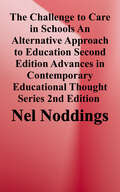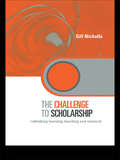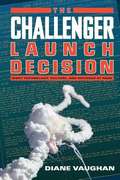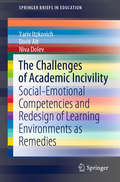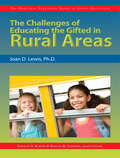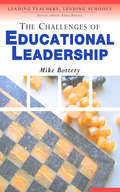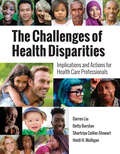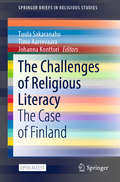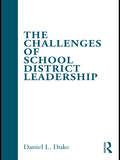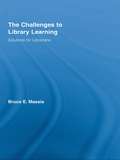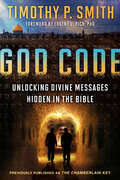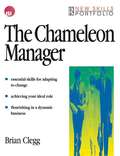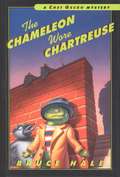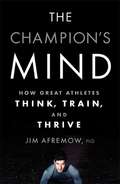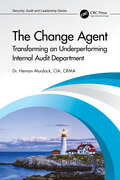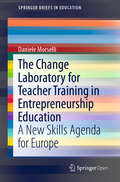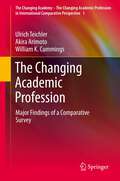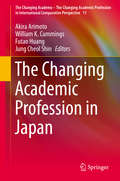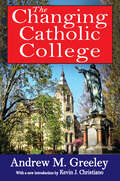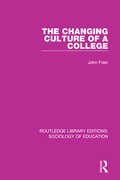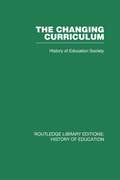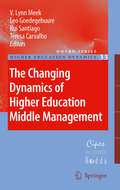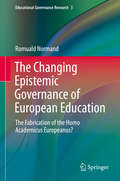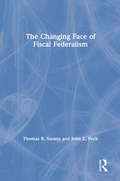- Table View
- List View
The Challenge to Care in Schools: An Alternative Approach to Education
by Nel NoddingsIn this second edition of her educational text, Noddings suggests that if we make the responsiveness characteristic of caring more basic than accountability, we can accommodate both traditional and progressive preferences in one school system to the benefit of all... especially the children.
The Challenge to Scholarship: Rethinking Learning, Teaching and Research (Key Issues in Higher Education)
by Gill NichollsThe Challenge to Scholarship is a lively and engaging investigation that seeks to establish what it means to be a scholar and the value of scholarship. It addresses current concerns and tensions including the scholarship of teaching and the relationship between teaching and research.Gill Nicholls gets right to the heart of the debate over scholarship and declares that a reconceptualization of scholarship within universities is required, outlining the changes involved and the practical implications for higher education institutions of the future.
The Challenger Launch Decision: Risky Technology, Culture, and Deviance at NASA
by Diane VaughanWhen the Space Shuttle Challenger exploded on January 28, 1986, millions of Americans became bound together in a single, historic moment. Many still vividly remember exactly where they were and what they were doing when they heard about the tragedy. In The Challenger Launch Decision, Diane Vaughan recreates the steps leading up to that fateful decision, contradicting conventional interpretations to prove that what occurred at NASA was not skulduggery or misconduct but a disastrous mistake. Journalists and investigators have historically cited production problems and managerial wrong-doing as the reasons behind the disaster. The Presidential Commission uncovered a flawed decision-making process at the space agency as well, citing a well-documented history of problems with the O-ring and a dramatic last-minute protest by engineers over the Solid Rocket Boosters as evidence of managerial neglect. Why did NASA managers, who not only had all the information prior to the launch but also were warned against it, decide to proceed? In retelling how the decision unfolded through the eyes of the managers and the engineers, Vaughan uncovers an incremental descent into poor judgment, supported by a culture of high-risk technology. She reveals how and why NASA insiders, when repeatedly faced with evidence that something was wrong, normalized the deviance so that it became acceptable to them. No safety rules were broken. No single individual was at fault. Instead, the cause of the disaster is a story not of evil but of the banality of organizational life. This powerful work explains why the Challenger tragedy must be reexamined and offers an unexpected warning about the hidden hazards of living in this technological age.
The Challenges of Academic Incivility: Social-Emotional Competencies and Redesign of Learning Environments as Remedies (SpringerBriefs in Education)
by Yariv Itzkovich Dorit Alt Niva DolevThe book introduces readers with theory and empirical findings related to uncivil behaviour in academic settings and discusses its precursors, implications and remedies. In the first part, we define academic incivility, its manifestations and dimensions, while distinguishing between academic incivility and workplace incivility. We then discuss the prevalence of faculty incivility (FI) and students’ incivility (SI) in academic settings and focus on the dyadic relationships between faculty and students in the broader context of incivility in academia, with an added focus on faculty incivility.The second part introduces the main contributors to academic incivility. Personal factors, in this case, social-emotional competencies, and contextual factors, in this case, learning environments, are explored by combining up-to-date research data, personal stories and interviews with lecturers and students. A deep understanding of the precursors of academic incivility is critical to the examination of possible coping strategies within academic settings and elsewhere.In the third part, we explore the potential and practical remedies that can mitigate incivility in academic settings and, in particular, the enhancement of emotional and social competencies and the modification of learning environments.
The Challenges of Educating the Gifted in Rural Areas
by Joan D. LewisThis book addresses the challenges and opportunities associated with educating gifted students in rural areas
The Challenges of Educational Leadership (Leading Teachers, Leading Schools Series)
by Dr Michael Bottery`It should be essential reading at the National College for School Leadership' - Michael Duffy, Times Educational Supplement, Friday Magazine `This book continues Michael Bottery's principled and persuasive assault on the application by policymakers of fashionable, shallow and decontextualised solutions (in this case leadership) to fundamental problems and issues in the definition, design and purposes of education. It is distinguished by its embeddedness in wider social science ideas and debates, enabling the challenges that schools and teachers face to be set in context, and by its sharp assessment of the impact of decades of the erosion of trust and meaning on educational work' - Jenny Ozga, Professor of Educational Research, Centre for Educational Sociology, University of Edinburgh In this book Mike Bottery presents critical issues about the purposes of educational leadership. He examines how `official' concepts of leadership are driven by demands which are not always to the educational, political, or social benefit of practitioners. This book will help educational leaders and aspiring educational leaders to examine their own values and practice.
The Challenges of Health Disparities: Implications and Actions for Health Care Professionals
by Darren Liu Betty Burston Shartriya C. Stewart Heidi H. MulliganThis unique text explores health disparities in the United States and their implications from the perspective of a health care administration The book begins with a broad overview of health disparities including definitions from local, state, and federal legislation, as well as alternative definitions. The authors examine current and past frameworks of analysis regarding the causes of disparities and provide a statistical overview of death rates and their implications for health care administrators. In the final section of the book, each chapter looks at health disparities within each type of health care environment such as physician practices, hospitals, pharmaceutical products, Medicare/Medicaid, long-term care, insurance markets, and more.
The Challenges of Religious Literacy: The Case of Finland (SpringerBriefs in Religious Studies)
by Timo Aarrevaara Tuula Sakaranaho Johanna KonttoriThis open access book presents religious literacy as the main explanatory factor when dealing with certain ethnic groups that attract stereotypes which gloss over other personal factors such as age, class, gender and cultural differences. It discusses freedom of religion, and the Christian revival movement. It examines religious literacy and religious diversity in multi-faith schools. It looks into the role of Mosques and Islamic divorce. Finally, it discusses the prevention of violent radicalization and extremism in Finland. Using recent data on Finnish secular society, the book promotes a new understanding which is needed with respect to popular and media portrayal of religion, or with respect to public discussion about religion. It addresses actors in civic society, public servants and higher education.
The Challenges of School District Leadership
by Daniel L. DukeDespite the rising interest in school districts, there are relatively few comprehensive resources available for graduate students in educational leadership programs. The Challenges of School District Leadership takes the position that the best way to prepare the next generation of school district leaders is to make certain that they are prepared to address the unending challenges that characterize public education today. Drawing on the latest research as well as actual examples, the book spotlights ten of the perennial challenges facing superintendents and school boards. Among the challenges discussed in detail are balancing equity and excellence, accommodating demographic change, coping with the increasing politicization of district leadership, deciding how to organize (or reorganize) a school system, and meeting the demands of educational accountability. This text is appropriate for graduate students in educational leadership, education policy, and the politics of education as well as school district leaders.
The Challenges to Library Learning: Solutions for Librarians (Routledge Studies in Library and Information Science #10)
by Bruce E. MassisThe Challenges to Library Learning: Solutions for Librarians is an insightful volume that offers a practical philosophy of engagement that can be used to meet the growing challenges facing librarians, including staffing shortages, depleted or eliminated training budgets, longer hours, greater workloads, and rapidly-changing technology, hindering the ability—and willingness—of employees to continue job education in library sciences. With three decades of experience as a library administrator, author Bruce E. Massis details an effective plan for inspiring initiative in the learner to pursue a goal-oriented and individualized approach to learning – helping the library to become more efficient, productive, and user-centered. Topics discussed include overcoming staff disengagement, accepting e-learning as a routine learning model, teaching and measuring information literacy training, creating a flexible alternative staffing model, the Community of Learning Program (CLP) for library staff, and the details of creating and implementing a training program. The Challenges to Library Learning: Solutions for Librarians is a vital and practical resource for anyone actively involved or pursuing a career in library administration.
The Chamberlain Key: Unlocking the God Code to Reveal Divine Messages Hidden in the Bible
by Robert Hostetler Eugene Ulrich Timothy P. SmithImagine you are a young, ambitious, successful appraiser of artifacts and antiquities—your services in demand by many of the most powerful individuals and branches of government in Washington, D. C. Your future could not seem brighter—except for a troubling dream...with the same mysterious message...on the same exact date...three years in a row... A True Story...Better Than Fiction Timothy P. Smith, heir to a renowned family business responsible for construction or renovation of some of America’s most cherished landmarks, struggled to understand the significance of his recurring dream...until he had another dream--one that identified a specific location where it seemed he might find answers to his questions. So Timothy drove to a remote spot in British Columbia. There the adventure--which later led to a startling discovery in the oldest Hebrew text of the Bible--began. It took the convergence of the sacred text, one man’s life, and modern computer technology to reveal messages that may explain dramatic world events, as well as influence every person alive today. Welcome to The Chamberlain Key. “However one wishes to interpret the meaning and significance of the text, they may rest assured that the text on which Timothy Smith bases his interpretation has almost certainly been there for a very long time, since before the birth of Christ.”—Eugene Ulrich, Ph.D.Department of Theology, University of Notre DameChief Editor, The Biblical Dead Sea Scrolls “For more than fifteen years I managed to keep the lid on a discovery that will dramatically redirect biblical scholarship, Christian theology, and perhaps even the trajectory of history itself.” –Timothy P. Smith What You Will Discover in The Chamberlain Key • An encrypted code in Genesis, in the oldest known Hebrew text of the Old Testament, centuries before predicted the birth and resurrection of Jesus. • Scientific evidence that this encrypted code was authored by the divine hand of God. • Signs that there are more encrypted codes in this same Hebrew text that will lead to additional messages from God to humanity • Hidden clues that may lead to the location of long-missing sacred artifacts, such as the Ark of the Covenant • Insights on why Timothy P. Smith was chosen to uncover this encrypted code. • A dire warning that God wants us to hear—and heed.
The Chameleon Manager (New Skills Portfolio Ser.)
by Brian CleggToday's managers are faced with many conflicting demands and situations. This book provides practical ways of achieving the impossible:*How can you be a generalist and a specialist?*An individual expert and a 'connected' team player?*Manage more people with less time and fewer resources and be entrepreneurial at the same time? Complete with its own website, which gives further information and links to other sites. The New Skills Portfolio is a groundbreaking new series, published in association with the Industrial Society, which re-defines the core management skills managers and team leaders need to be competitive. Each title is action-focused blending 20th century management initiatives/trends with a new flexible skills portfolio.The Industrial Society is one of the largest public training providers in the UK. It has over 10,000 member organisations and promotes best practice through its publishing, consultancy, training and advisory services. For more information contact their website on www.indsoc.co.uk
The Chameleon Wore Chartreuse: A Chet Gecko Mystery
by Bruce HaleChet Gecko loves a good mystery. Almost more than he loves his fee--stinkbug pie. So when fellow fourth grader Shirley Chameleon asks him to find her missing brother, Billy, Chet expects the case to be as easy a pie. But Billy's disappearance is part of a larger plot, one that involves the Rat Sisters, a riddling junkyard dog, and a vicious Gila monster named Herman. If Chet doesn't solve the case fast, the entire school could be humiliated. Worst of all, Chet might not get his fee. And Chet's hungry. . . .
The Champion's Mind: How Great Athletes Think, Train, and Thrive
by Jim AfremowEven amongst the most elite performers, certain athletes stand out as a cut above the rest, able to outperform in clutch, game-deciding moments. These athletes prove that raw athletic ability doesn't necessarily translate to a superior on-field experience--it's the mental game that matters most. Sports participation--from the recreational to the collegiate Division I level--is at an all-time high. While the caliber of their game may differ, athletes at every level have one thing in common: they want to excel. In The Champion's Mind, sports psychologist Jim Afremow, PhD, LPC, now offers the same advice he uses with Olympians, Heisman Trophy winners, and professional athletes, including: • Tips and techniques based on high-performance psychology research, such as how to get in a "zone," thrive on a team, and stay humble • How to progress within a sport and sustain excellence long-term • Customizable pre-performance routines to hit full power when the gun goes off or the puck is dropped
The Chance You Won't Return
by Annie CardiWhen your mom thinks she's Amelia Earhart, navigating high school, first love, and family secrets is like flying solo without a map. Driver's ed and a first crush should be what Alex Winchester is stressed out about in high school -- and she is. But what's really on her mind is her mother. Why is she dressing in Dad's baggy khaki pants with a silk scarf around her neck? What is she planning when she pores over maps in the middle of the night? When did she stop being Mom and start being Amelia Earhart? Alex tries to keep her budding love life apart from the growing disaster at home as her mother sinks further into her delusions. But there are those nights, when everyone else is asleep, when it's easier to confide in Amelia than it ever was to Mom. Now, as Amelia's flight plans become more intense, Alex is increasingly worried that Amelia is planning her final flight -- the flight from which she never returns. What could possibly be driving Mom's delusions, and how far will they take her?
The Change Agent: Transforming an Underperforming Internal Audit Department (Security, Audit and Leadership Series)
by Hernan MurdockJohn Taylor has been hired to transform the underperforming internal audit unit at InSports. The auditors are not reviewing what the audit committee and executive leadership consider essential for the organization’s success, their methodology is subpar, and their relationships with their clients are strained. The audit committee has been patient, but not anymore. Their mandate is clear: make clear improvements in one year or the function will be outsourced. This is the story of a visionary leader who needs a strategy to transform processes and deliver better results for stakeholders at all levels within the organization. The audit committee, all levels of management, and employees expect more from internal audit. Now, John must lead the group through 12 challenging months as they focus on what matters most when performing audit and advisory services. They must communicate results faster and better, leverage existing quality control and data analytics techniques, and, with every encounter, help the organization address strategic, operational, compliance, and financial risks. With similarities to "The Goal" and "The Phoenix Project" and leveraging Kotter’s 8-Step Process for Leading Change, follow John and the internal audit team from Boston to New York, San Francisco, London, and Buenos Aires, as they address almost insurmountable challenges in their transformation journey.
The Change Laboratory for Teacher Training in Entrepreneurship Education: A New Skills Agenda for Europe (SpringerBriefs in Education)
by Daniele MorselliThis open access book illustrates a new type of formative intervention for in-service teacher training in entrepreneurship education. The book describes a Change Laboratory and shows how teachers and workshop assistants develop the idea of a multidisciplinary project (area di progetto) entailing the design of a self-service and parking lot in a dismissed area close to the city centre. The multidisciplinary project is taken as example of how an idea is debated and turned into collective action and change, the very essence of initiative and entrepreneurship. This includes preparing the students for the enterprise world, for example by teaching them competencies with authentic problems; students working by projects; group work; showing initiative and autonomy. The book considers diverse levels of change brought about by this formative intervention: the teachers, the curriculum, the students, eventually the whole institution. The Change Laboratory thus increases the participation of students, teachers and stakeholders in the school towards a new curriculum through the implementation of a multidisciplinary project connecting school with the world outside and working life.The book features a foreword by Yrjo Engestrom, one of the fathers of the Change Laboratory toolkit and the principal investigator (PI) of this study. The study is financed by European Commission within Horizon 2020.
The Changing Academic Profession
by William K. Cummings Ulrich Teichler Akira ArimotoThis book provides an overview on the major findings of a questionnaire survey of academic profession in international perspective. More than 25,000 professors and junior staff at universities and other institutions of higher education at almost 20 countries from all over the world provide information on their working situation, their views and activities. The study "The Changing Academic Profession" is the second major study of its kind, and changes of views and activities are presented through a comparison of the findings with those of the earlier study undertaken in the early 1990s. Major themes are the academics' perception of their societal and institutional environments, the views on the major tasks of teaching, research and services, their professional preferences and actual activities, their career, their perceived influence and their overall job satisfaction. Emphasis is placed on the influence of recent changes in higher education: the internationalisation and globalisation, the increasing expectation to provide evidence of the relevance of academic work, and finally the growing power of management at higher education institutions. Overall, the academics surveyed show that worldwide discourses and trends in higher education put their mark on the academic profession, but differences by country continue to be noteworthy. Academics consider themselves to be more strongly exposed to mechanism of regulations, incentives and sanctions as well as various assessments than in the past; yet their own freedom, and responsibilities and influence shape their identity more strongly and are reflected in widespread professional satisfaction.
The Changing Academic Profession in Japan
by William K. Cummings Jung Cheol Shin Akira Arimoto Futao HuangThis volume provides an empirical and qualitative analysis of the nature and extent of the Japanese academic profession, with a special focus on the changes that occurred in the period between 1992 and 2007. Based on responses to two comprehensive surveys administered to faculty samples with a similar questionnaire, the book presents key aspects of the academic activities and views of Japanese faculty members. Divided into five sections, the book describes the changing social, economic and educational environment, academic organization and life, productivity, as well as the effects of the profession on society. The last section describes the Japanese academic profession as observed from the USA and Asia. In addition to its focus on empirical analysis, the book makes use of historical and comparative perspectives to explore the various aspects of the changes that have occurred in the academic profession in this non-English-speaking country.
The Changing Catholic College (Monographs In Social Research #No. 13)
by Andrew M. GreeleyAlmost all of America's private colleges and universities started out as denominational schools, but connections with sponsoring churches gradually attenuated over the last century. Only fundamentalist Protestant denominations and the Roman Catholic Church still maintain colleges and universities closely tied to the spirit of their denominations. Catholic higher education is the largest of these systems, producing a significant proportion of America's college graduates, trained professionals, and doctorates.Andrew M. Greeley argues that Catholic schools are no better and no worse than the vast majority of American higher educational institutions. He chooses a sample of schools varying in the degree to which changes are evident, without revealing this key to his investigator team. Greeley and his field team then visit the schools, interviewing significant segments of each, and characterize each in terms of recent growth and elements which are critical in fostering and supporting such changes.Greeley briefly summarizes information on the history of Catholic higher education. He then furnishes descriptions of three rapid-improvement, three medium-improvement, and three low-improvement schools. In a summary, he provides evidence that the quality of administrative leadership predicts academic improvement in a Catholic college or university. In the final sections, Greeley reviews the administrations, faculties, and student bodies at Catholic colleges and universities, and offers general observations about the outlook for Catholic higher education in the United States.
The Changing Culture of a College (Routledge Library Editions: Sociology Of Education Ser.)
by John FrainAs a result of the Liverpool City Council's reorganization of its Further Education Service, the South Mersey College was established on September 1, 1986 through the amalgamation of the Riverside College of Technology and the Childwall Hall College of Further Education; two of the city's eight colleges of further education. This book provides a
The Changing Curriculum
by History of Education SocietyThis was originally published in 1971.Recent years have seen a renewal of interest in the field of curriculum development. Until now, however, relatively little account has been taken of the historical aspects of curriculum change. Topics covered include: The relationship between Renaissance achievements and humanist education The contribution made by educationists of the Civil War period who drew their inspiration from science rather than the classics. The formation in the eighteenth century of "academic honeycombs" – groups of scholars concerned with the growth of science and technology. Nineteenth century developments on art education and an assessment of the work of the scientific innovators.
The Changing Dynamics of Higher Education Middle Management
by V. Lynn Meek Leo Goedegebuure Rui Santiago Teresa CarvalhoKnown as either 'soft' or 'hard' 'managerialism', 'new managerialism' or 'new public management', this new narrative has, irrespective of moniker, permeated the institutions of higher education almost everywhere. Taking this as its context, this volume is founded on a comprehensive international comparative analysis of the evolving role of middle-level academic managers--deans, heads of department and their equivalents. The chapters address key questions that will determine the future of academe: have the imperatives of management theory caused a realignment of the values and expectations of middle-level academic managers? In what way do the new expectations placed on this group shape the academic profession as a whole? And, whose interests do middle-level academic managers represent? Based on material presented at one of the high-level Douro Seminars on research into tertiary education, this volume systematically combines theoretical views with empirical analysis. It argues that 'managerialist' pressure has resulted in changes in the way academic performance is measured. There has been a shift in criteria away from research reputation, teaching and scholarship to the measurement of performance based upon management capacities. This has given middle-level academic managers a pivotal role halfway between the predilections of high-level decision makers and the maintenance of academic values and control. The enhanced expectations and more defined functions of middle-level academic managers are in clear contrast to earlier times, when the position was considered a public-spirited rite of passage for career-minded academics. Despite this, the contributors to this book believe that the middle-level managers in the ten countries examined are neither corporate lackeys nor champions of academe. It is becoming increasingly clear that the ability of organisations to achieve their aims is largely dependent on the skill and dedication of middle managers. Past studies of organisational dynamics have been preoccupied with the executive level of management. This text, which will be of great interest to researchers and policy makers alike, attempts to redress the balance.
The Changing Epistemic Governance of European Education
by Romuald NormandThis book examines the transformations of epistemic governance in education, the way in which some actors are shaping new knowledge, and how that new knowledge impacts other actors in charge of implementing this knowledge in the context of the decision-making process and practice. The book describes knowledge-based and evidence-based technologies that produce new modes of representation, cognitive categories, and value-based judgements which determine and guide actions and interactions between researchers, experts and policy-makers. It explores several major social theories and concepts, analysing the transformation of the relationship between educational and social sciences and politics. In the light of epistemic governance being linked to transformations of academic capitalism, the book describes the ways in which academics engaged in heterogeneous networks are capable of developing new interactions as well as facing new trials imposed on them by the changing conditions of producing knowledge in their scientific community and within their institutions. Knowledge is power. It is materialized in metrics, policy instruments and embedded in networks. The governance of European higher education, insightfully argues Romuald Normand, is not structured by hierarchical public policies, by governmental exercise of authority or heroic decision making. Normand makes a sophisticated intellectual argument, building upon the work of Foucault, Latour (Sociology of science), and the pragmatic sociology of Boltanski and Thévenot (sociology of justification) in order to precisely analyse Europe's higher education through the circulation of ideas and instruments. Based upon precise research, the book is a major contribution to the understanding of high education in a capitalist Europe, beyond the simple idea of neo liberalism. Normand, provocatively, even suggests the making of a European Homo Academicus. This is an innovative and important book for public policy, European Studies and the sociology of Education. Patrick le Galès, FBA, CNRS Research Professor, Centre d'Etudes Européennes, Sciences Po, Paris, France
The Changing Face of Fiscal Federalism
by Thomas R. Swartz John E. PeckA remarkable change has occurred in how we finance the public enterprise, yet this change has gone largely unnoticed by the general public. Policy makers in the federal, state and local levels of government have had to respond to this change. The causes of the change, future policy directions, and the eventual impact on society of this change is the subject of this book. Six of the nation's most influential economists, political scientists and sociologists have been asked to comment and their views can be found here.
